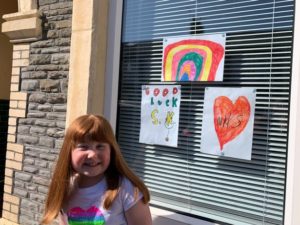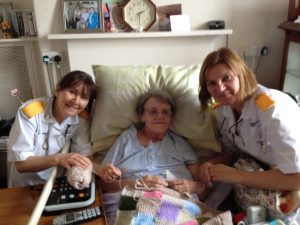 The video of the Prima Ballerina Marta C. González reliving her dance to the music of Swan Lake from the depths of dementia, has gone viral. She is sitting in a wheelchair when her caregiver places headphones over her ears. As the music begins a flicker of recognition and sadness sweep across her face and she makes a little dismissive movement with her hand. Her caregiver, who is kneeling at her eye level, gently picks up her hand and kisses it to encourage her, a traditional theatrical gesture. As the main melody to the ballet plays through her headphones, her arms and hands re-enact the graceful movements she had performed on stage in 1967.
The video of the Prima Ballerina Marta C. González reliving her dance to the music of Swan Lake from the depths of dementia, has gone viral. She is sitting in a wheelchair when her caregiver places headphones over her ears. As the music begins a flicker of recognition and sadness sweep across her face and she makes a little dismissive movement with her hand. Her caregiver, who is kneeling at her eye level, gently picks up her hand and kisses it to encourage her, a traditional theatrical gesture. As the main melody to the ballet plays through her headphones, her arms and hands re-enact the graceful movements she had performed on stage in 1967.
At the music’s crescendo, Ms González is completely lost in the performance, her motions and facial expressions exactly mirroring those she’d mastered decades earlier. You see the eloquent wings of the dying swan; the emotions and the grief. The video includes flashbacks of her dancing on stage. After she finishes, she gently strokes the caregiver’s face with gratitude. It shows too, the beauty and the power of compassion and good caregiving.
‘It is truly amazing & shows that she is still there inside,’ says a comment.
She is indeed, still there inside, with the music and ballet that was her life still at the core of her being. Music through headphones is immersive, and it took her there, knowing what she was doing, knowing who she is. When she stroked the caregiver’s cheek in gratitude, she was fully herself. The music that formed her life helped bring her forward, out through the curtains of dementia. When a person comes to him or herself in that way, it’s known as ‘rementing’; it usually doesn’t last long but it demonstrates that the person remains true to themselves, momentarily freed from the effects of the dementia. In his book, ‘Challenging Behaviour in Dementia: A Person-Centred Approach,’ Professor Graham Stokes, head of BUPA care states categorically, ‘the person remains‘.
Many examples of ‘rementing’ are described in my books on dementia. A overseas missionary came back to help her her faither-in-law, a former pastor now in late stage dementia. He had been silent and uncommunicative for months. She told me how he sat slumped, his head down, seemingly oblivious to everything. She chatted to him, with no response. She read a few Scriptures and prayed a little, then holding his hand began to sing, ‘Jesus loves me, this I know …’ As she finished, she heard him say ‘again’ so, surprised, she sang it once more. At the end he repeated, ‘again’, so she sang it one more time. The third time he repeated, ‘again’, and as she began to sing, he lifted his head and joined in with her. Rementing in Christians is often prompted by spiritual input.
Many more ‘rementings’ are described in my books about dementia. (Available at usual retailers, also at www.pilgrimsfriend.org.uk).
And today, thanks to this compassionate Spanish caregiver, you can watch a lovely example of ‘rementing’, here: https://youtu.be/f9iT59-faKE
















